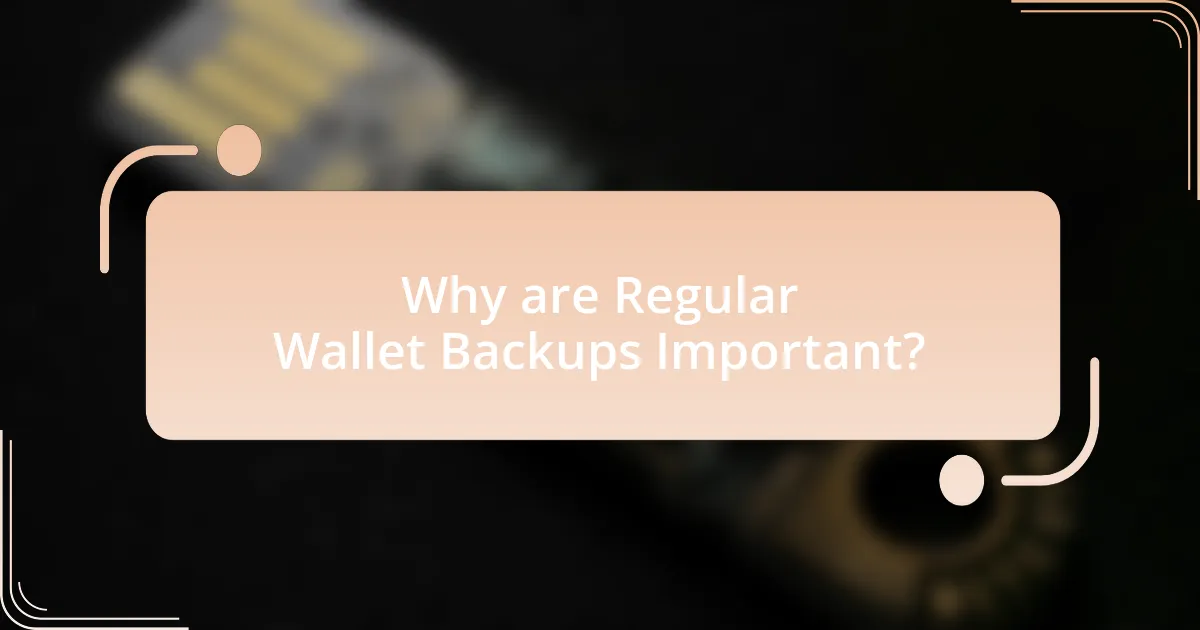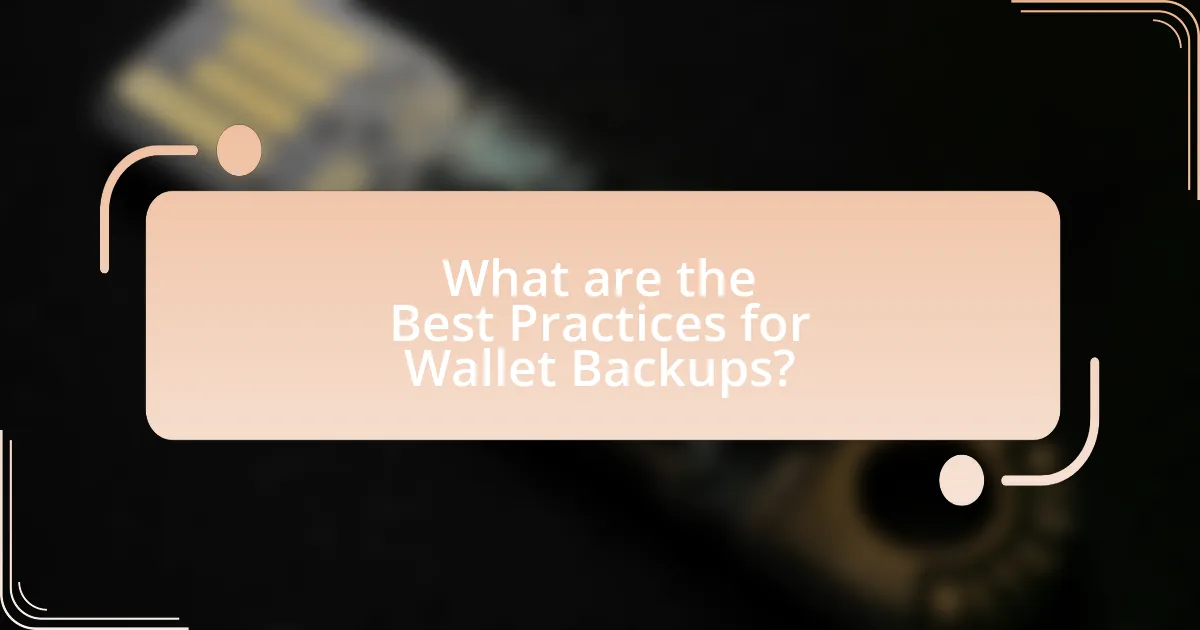Regular wallet backups are crucial for safeguarding digital assets against loss due to device failure, theft, or accidental deletion. Approximately 20% of Bitcoin is considered lost due to inadequate backup practices, highlighting the risks associated with not backing up wallets. This article outlines the importance of regular backups, the potential consequences of wallet loss or theft, and best practices for ensuring wallet security. It also discusses effective backup methods, the specific needs of different wallet types, and common mistakes to avoid, providing a comprehensive guide to maintaining secure and accessible wallet backups.

Why are Regular Wallet Backups Important?
Regular wallet backups are important because they protect users from losing access to their digital assets due to device failure, theft, or accidental deletion. Without regular backups, users risk permanent loss of their cryptocurrencies or digital tokens, as these assets are often stored locally on devices. According to a study by Chainalysis, approximately 20% of Bitcoin is considered lost due to users failing to back up their wallets properly. This statistic underscores the necessity of maintaining up-to-date backups to ensure recovery options are available in case of unforeseen circumstances.
What risks are associated with not backing up your wallet?
Not backing up your wallet poses significant risks, including the permanent loss of access to your funds and sensitive information. If a device is lost, stolen, or damaged, without a backup, all cryptocurrencies and data stored in the wallet become irretrievable. According to a study by Chainalysis, approximately 20% of Bitcoin is considered lost due to users failing to back up their wallets. This statistic underscores the critical importance of regular backups to safeguard digital assets against unforeseen circumstances.
How can losing access to your wallet affect your assets?
Losing access to your wallet can result in the permanent loss of your assets, as wallets often store private keys necessary for accessing cryptocurrencies or digital assets. Without these keys, users cannot retrieve their funds, leading to a total loss of ownership. For instance, a study by Chainalysis in 2020 revealed that approximately 3.7 million Bitcoin, worth billions of dollars, were lost due to users losing access to their wallets. This highlights the critical need for regular wallet backups to prevent such irreversible losses.
What are the potential consequences of wallet theft or loss?
The potential consequences of wallet theft or loss include financial loss, identity theft, and loss of access to digital assets. Financial loss occurs when thieves gain access to funds stored in the wallet, which can lead to unauthorized transactions. Identity theft can happen if personal information, such as identification documents or sensitive data, is compromised, allowing criminals to impersonate the victim. Additionally, loss of access to digital assets, such as cryptocurrencies, can result from losing the private keys associated with the wallet, making it impossible to recover those assets. According to a report by the Federal Trade Commission, identity theft cases have increased significantly, highlighting the risks associated with wallet theft or loss.
How do regular backups enhance wallet security?
Regular backups enhance wallet security by ensuring that users can recover their funds in case of loss, theft, or corruption. When a wallet is backed up, it creates a secure copy of the wallet’s private keys and transaction history, which are essential for accessing and managing cryptocurrency assets. This redundancy protects against scenarios such as hardware failure or malware attacks, where the original wallet may become inaccessible. According to a study by the Blockchain Research Institute, 30% of cryptocurrency users have lost access to their wallets due to various issues, highlighting the critical need for regular backups to mitigate such risks.
What methods can be used for effective wallet backups?
Effective wallet backups can be achieved through methods such as creating encrypted digital copies, utilizing hardware wallets, and employing mnemonic phrases. Encrypted digital copies involve securely storing wallet files on external drives or cloud services with strong encryption to prevent unauthorized access. Hardware wallets, which are physical devices designed to securely store cryptocurrency keys offline, provide an additional layer of security against online threats. Mnemonic phrases, consisting of a series of words generated during wallet creation, allow users to recover their wallets if access is lost, as long as the phrase is kept secure. These methods collectively enhance the safety and accessibility of wallet backups, ensuring that users can recover their assets in case of loss or theft.
How often should you perform wallet backups for optimal security?
You should perform wallet backups at least once a week for optimal security. Regular backups ensure that you have the latest transaction data and wallet information secured, minimizing the risk of loss due to hardware failure, theft, or software issues. According to cybersecurity best practices, frequent backups help maintain data integrity and provide a reliable recovery option in case of emergencies.

What are the Best Practices for Wallet Backups?
The best practices for wallet backups include creating multiple copies of your wallet backup, storing them in secure locations, and using encryption for added security. Multiple copies ensure that if one backup is lost or damaged, others remain accessible. Secure locations can include external hard drives, USB drives, or cloud storage services with strong security measures. Encrypting backups protects sensitive information from unauthorized access, making it crucial for safeguarding digital assets. Following these practices minimizes the risk of losing access to your wallet and enhances overall security.
What types of wallets require regular backups?
Hot wallets and software wallets require regular backups. Hot wallets, which are connected to the internet, are vulnerable to hacking and data loss, making frequent backups essential to safeguard funds. Software wallets, installed on devices, also necessitate regular backups to prevent loss due to device failure or accidental deletion. Regular backups ensure that users can restore access to their cryptocurrencies in case of unforeseen issues.
How do hardware wallets differ from software wallets in backup needs?
Hardware wallets require physical backup methods, such as seed phrases written on paper or stored in secure locations, while software wallets often rely on digital backups, like cloud storage or encrypted files. The need for physical backups in hardware wallets stems from their offline nature, which enhances security but necessitates careful management of recovery phrases. In contrast, software wallets, being online, can utilize automated backup solutions, but they are more vulnerable to hacking and data loss. This distinction highlights the importance of understanding the specific backup strategies required for each type of wallet to ensure the safety of digital assets.
What specific features should you look for in a wallet backup solution?
A wallet backup solution should include features such as encryption, multi-device compatibility, ease of recovery, and regular update capabilities. Encryption ensures that sensitive information remains secure, protecting against unauthorized access. Multi-device compatibility allows users to access their wallet backups across different platforms, enhancing convenience. Ease of recovery is crucial, as it enables users to restore their wallets quickly in case of loss or theft. Regular update capabilities ensure that the backup remains current with the latest transactions and changes, minimizing the risk of data loss. These features collectively enhance the reliability and security of wallet backup solutions.
How can you ensure your wallet backups are secure?
To ensure your wallet backups are secure, utilize strong encryption methods and store backups in multiple secure locations. Strong encryption protects your backup files from unauthorized access, while storing them in different physical or cloud locations mitigates the risk of loss due to theft, fire, or hardware failure. According to a study by the Cybersecurity & Infrastructure Security Agency, using encryption can reduce the risk of data breaches significantly, emphasizing the importance of these security measures.
What encryption methods can protect your backup files?
Encryption methods that can protect your backup files include AES (Advanced Encryption Standard), RSA (Rivest-Shamir-Adleman), and Twofish. AES is widely recognized for its strength and efficiency, utilizing key sizes of 128, 192, or 256 bits, making it suitable for securing sensitive data. RSA, a public-key encryption method, allows secure data transmission and is commonly used for encrypting small amounts of data, such as encryption keys. Twofish, a symmetric key block cipher, offers high performance and security, supporting key sizes up to 256 bits. These methods are validated by their adoption in various security protocols and standards, ensuring robust protection for backup files against unauthorized access.
How can you safely store your backup information offline?
To safely store your backup information offline, use external hard drives or USB flash drives that are encrypted. Encryption protects your data from unauthorized access, ensuring that even if the physical device is lost or stolen, the information remains secure. According to a study by the Ponemon Institute, 60% of small businesses that suffer a data breach go out of business within six months, highlighting the importance of secure backup methods. Additionally, store these devices in a safe location, such as a locked drawer or a safe, to further minimize the risk of physical theft.

What Common Mistakes Should Be Avoided in Wallet Backups?
Common mistakes to avoid in wallet backups include failing to create multiple copies, neglecting to store backups in secure locations, and using weak passwords. Creating only one backup increases the risk of loss due to hardware failure or theft. Storing backups in insecure locations, such as cloud services without encryption, exposes them to unauthorized access. Additionally, weak passwords can be easily compromised, making the wallet vulnerable. According to cybersecurity experts, using strong, unique passwords and enabling two-factor authentication significantly enhances security.
What are the pitfalls of using cloud storage for wallet backups?
Using cloud storage for wallet backups poses significant security risks, primarily due to potential unauthorized access and data breaches. Cloud services can be vulnerable to hacking, which may lead to the exposure of sensitive wallet information. For instance, a 2020 report by Cybersecurity Ventures estimated that cybercrime damages would reach $6 trillion annually, highlighting the increasing threat to digital assets stored in the cloud. Additionally, reliance on third-party providers can result in loss of control over data, as users may not fully understand the security measures in place. Furthermore, if a cloud service provider experiences downtime or goes out of business, access to wallet backups could be permanently lost. These factors collectively underscore the inherent risks associated with using cloud storage for wallet backups.
How can sharing backup information lead to security breaches?
Sharing backup information can lead to security breaches by exposing sensitive data to unauthorized individuals. When backup information, such as private keys or recovery phrases, is shared, it increases the risk of interception by malicious actors who can exploit this data to gain access to digital wallets. For instance, a study by the Cybersecurity & Infrastructure Security Agency (CISA) highlights that 90% of data breaches occur due to human error, including the accidental sharing of sensitive information. This demonstrates that careless sharing practices can significantly compromise security, making it essential to keep backup information confidential and secure.
What are the risks of neglecting to update backups regularly?
Neglecting to update backups regularly exposes data to significant risks, including data loss, corruption, and vulnerability to cyberattacks. When backups are outdated, they may not reflect the most recent changes or additions, leading to the potential loss of critical information during a system failure or data breach. For instance, a study by the Ponemon Institute found that 60% of small businesses that experience a data loss event close within six months, highlighting the severe consequences of inadequate backup practices. Additionally, outdated backups can become targets for ransomware attacks, as attackers often exploit known vulnerabilities in older systems. Regularly updating backups mitigates these risks by ensuring that the most current data is preserved and protected against threats.
How can you troubleshoot wallet backup issues?
To troubleshoot wallet backup issues, first verify that the backup file is complete and not corrupted by checking its size and integrity against known standards. If the backup file appears intact, ensure that you are using the correct wallet software version that matches the backup format, as discrepancies can lead to restoration failures. Additionally, check for any software updates or patches that may address known issues with wallet backups. If problems persist, consult the wallet’s official documentation or support channels for specific troubleshooting steps related to your wallet type.
What steps should you take if you cannot restore your wallet from a backup?
If you cannot restore your wallet from a backup, the first step is to verify that you are using the correct recovery phrase or private key associated with your wallet. Ensure that there are no typos or errors in the input. If the recovery phrase is correct but still does not work, check for any software updates for your wallet application, as outdated versions may have bugs affecting restoration. Additionally, consult the wallet provider’s support resources or community forums for troubleshooting tips specific to your wallet type. If all else fails, consider reaching out to customer support for assistance, as they may provide further guidance or solutions based on your specific situation.
How can you verify the integrity of your wallet backups?
To verify the integrity of your wallet backups, you should perform checksum verification on the backup files. This involves generating a checksum value (like SHA-256) for the original wallet data and comparing it to the checksum of the backup file. If both values match, the backup is intact and has not been altered. This method is widely used in data integrity verification, as it provides a reliable way to ensure that the backup is an exact copy of the original data.
What are some practical tips for maintaining wallet backups?
To maintain wallet backups effectively, regularly create and securely store multiple copies of your wallet backup files. This practice ensures that you have access to your funds even if one copy is lost or damaged. Use encrypted storage solutions, such as hardware wallets or secure cloud services, to protect your backup files from unauthorized access. Additionally, verify the integrity of your backups periodically by restoring them in a safe environment to ensure they function correctly. According to cybersecurity experts, maintaining at least three copies of your backup in different physical locations significantly reduces the risk of total loss.